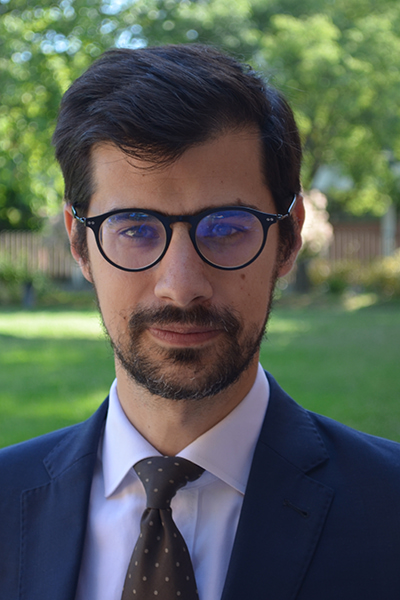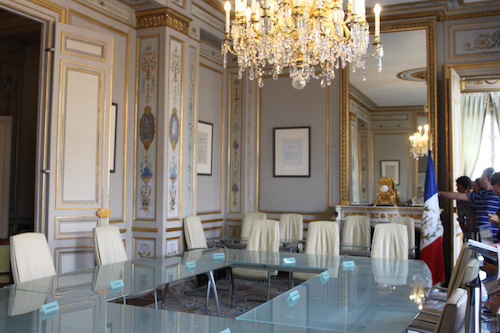- Research,
‘Understanding the role of the constitutional judge’: words from Mathieu Carpentier, professor of public law at the Toulouse School of Law

• Can you briefly describe your career path and what brought you to UT Capitole?
My career path has been somewhat unusual. After studying philosophy and then law, I defended my thesis in philosophy of law at Paris 1 Panthéon-Sorbonne University in 2013. In 2014, I became a lecturer in public law at Paris Panthéon-Assas University. I then passed the competitive examination for the agrégation in public law, which led to my appointment as professor of public law at Toulouse Capitole University in 2016.
• What are your main research topics?
My research focuses mainly on two areas, although I also write on various aspects of current public law issues, particularly French constitutional law and public finance law.
My primary area of research is contemporary legal theory and philosophy, and I seek to explore several salient aspects of this field. I work both on questions of methodology in the philosophy of law and on concrete subjects, such as the concept of legal validity or the logic of legal reasoning: how lawyers construct their arguments to apply or interpret a rule, a subject that formed the core of my doctoral thesis.
The second main focus of my research concerns a central issue in constitutional theory: the role and legitimacy of constitutional judges, that means the bodies responsible for reviewing the constitutionality of laws, such as the Constitutional Council in France. To this end, I seek to propose an interdisciplinary approach, combining comparative law studies and political reflections on legitimacy. At a time when, in France as in many democracies, the role of the constitutional judge is contested on both sides of the political spectrum, my research seeks to promote a nuanced and contextually dependent approach to this issue.

• Could you share a concrete example or recent project that illustrates your work?
My work on constitutional justice has led to a project funded by the Institut universitaire de France between 2022 and 2027: entitled ‘Models of Constitutional Justice’, it will result in the publication of a book, currently being written.
This project aims to defend the idea that the legitimacy of constitutional judges necessarily depends on the institutional and political context in which they operate. To this end, I draw on a comparative study of some twenty constitutional justice systems, considering several parameters: the methods of appointing judges; the nature of the reasoning followed in decisions; relations with other constitutional bodies – not only the legislature, but also the executive; the final say of the constitutional judge; the democratic vitality of constitutional institutions, etc.
• How does your research interact with other disciplines or approaches, and what do you gain from these exchanges?
Interdisciplinarity is a risk... but it is also an opportunity.
My background as a legal theorist and philosopher of law naturally inclines me towards interdisciplinarity. My work in comparative constitutional law and constitutional theory necessarily engages with legal and political philosophy: my goal is to foster dialogue between, on the one hand, comparatists, who are very attentive to the importance of contextual variations, and, on the other hand, theorists and philosophers, whose thinking can sometimes be overly abstract.
As for my work in legal theory and philosophy, it is in constant dialogue with philosophy on the one hand (particularly the philosophy of language and knowledge) and computer science and logic on the other. I am fortunate to have several colleagues in Toulouse, particularly at the Faculty of Computer Science at UT Capitole, who are open to interdisciplinarity. I am currently working with Jean-Guy Mailly and Sylvie Doutre on a project, funded by the IRSI (International Research for Society Institute), on the role of exceptions in legal reasoning. The idea is not to change the way laws are applied and interpreted, but to model this reasoning in order to try to reproduce it using decision support tools, that means tools designed to assist lawyers in their analyses.
Interdisciplinarity is a risk: one cannot claim to acquire all the knowledge and skills specific to each disciplinary field one wishes to embrace. But it is also an opportunity, insofar as breaking down the barriers between disciplines seems to me to be the only way to extract them from the matrix of tradition – and sometimes intellectual laziness – in which practitioners of monodisciplinarity confine them.
As for my work in legal theory and philosophy, it is in constant dialogue with philosophy on the one hand (particularly the philosophy of language and knowledge) and computer science and logic on the other. I am fortunate to have several colleagues in Toulouse, particularly at the Faculty of Computer Science at UT Capitole, who are open to interdisciplinarity. I am currently working with Jean-Guy Mailly and Sylvie Doutre on a project, funded by the IRSI (International Research for Society Institute), on the role of exceptions in legal reasoning. The idea is not to change the way laws are applied and interpreted, but to model this reasoning in order to try to reproduce it using decision support tools, that means tools designed to assist lawyers in their analyses.
Interdisciplinarity is a risk: one cannot claim to acquire all the knowledge and skills specific to each disciplinary field one wishes to embrace. But it is also an opportunity, insofar as breaking down the barriers between disciplines seems to me to be the only way to extract them from the matrix of tradition – and sometimes intellectual laziness – in which practitioners of monodisciplinarity confine them.
• How does your research contribute to addressing current societal issues or shedding light on the socio-economic world?
My work informs concrete proposals, for example on Article 49.3 or on the constraints that limit parliamentarians' legislative initiative.
Like most of my colleagues, I harbour the hope – some would say the illusion – that my doctrinal writings, particularly on constitutional law and public finance, will influence judges and other public decision-makers. Thus, when I propose, for example, to amend the rules on the financial inadmissibility of parliamentary initiatives; to enhance the role of the ratification law with regard to Article 38 ordinances; to abolish the partial use of ‘49.3’ on successive parts of the finance bill or social security financing bill, which renders parliamentary debate meaningless; or to amend the rules governing the functioning of the Constitutional Council, these are all concrete proposals, which I hope will not remain entirely unheeded.
For the rest, my research in legal philosophy, constitutional theory and comparative law remains fundamental research, which has no direct societal impact.
For the rest, my research in legal philosophy, constitutional theory and comparative law remains fundamental research, which has no direct societal impact.
My work on constitutional theory and comparative law certainly puts forward proposals: I would like to help move away from binary thinking about constitutional judges, who are sometimes revered as guardians of the rule of law and freedoms, and sometimes vilified for hindering the expression of the general will by the representatives of the people.
However, I am well aware that academics have limited ability to make their voices heard in public debate, especially when they seek to bring nuance and complexity to the analysis of the phenomena they study.
• What motivates you most in your work as a researcher and in the prospects for your research?
Research ethics is above all a matter of ethical discussion.
It may seem paradoxical, given how individual legal research is, but it is above all the collective dimension of research that motivates and fascinates me.
Of course, collaborative projects are essential to any interdisciplinary research: working with colleagues whose intellectual and scientific horizons sometimes differ from your own is an incredible opportunity, even if it can sometimes be confusing.
But beyond collective projects, the collective dimension of individual research is also essential: nothing is more stimulating for me than presenting work in progress at a conference or workshop and submitting it to the criticism (sometimes harsh and severe, often rightly so!) of people I respect and admire. Research ethics is above all an ethic of discussion.
* Photo : Faqscl, licence CC BY-SA 4.0 — View details
